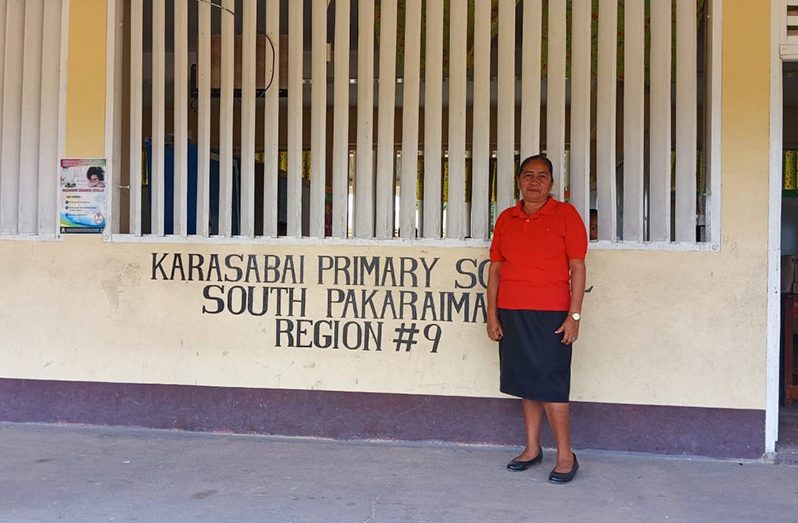MICHELLE George is a schoolteacher in her community, Karasabai, a remote village that has seen its fair share of development in recent times to maintain its sustainability.
Born in Laluni, Soesdyke/Linden Highway, but raised in Karasabai, Region Nine, George is familiar with the locals and children. She wanted to give back to the community and became a teacher so she could reside and work in the same village.
As a resident, there is no other place better than home for George, who is passionate about her role in the community.
She spends most of her time at Karasabai Primary School, and when she is at home, she listens to her husband’s endless banter about cows and horses.
He is one of the real vaqueros of Karasabai, who are very traditional and have maintained that culture over the years.
George has been a schoolteacher for the past 30 years. She told Pepperpot Magazine that her parents used to work at Laluni as farmers, and she originated there, but as a baby, they relocated to Karasabai, and that’s where she wants to be.
She added that she loves gardening. She has her own plot next to her home, where she has cultivated cassava and other crops.
George also has some cows and other livestock that she rears for meat. She simply loves their simple way of life, where the air is fresh, they have a lot of space, and they are surrounded by a beautiful landscape of mountains.
The South Pakaraimas mountain range is within view, and others like George and her family reside at the foothills and surrounding areas, where they never tire of the scenic views and breathtaking landscape.

The schoolteacher stated that she really likes it there, enjoying the freedom to do things such as picnicking, fishing by the creek, having freshly caught roast fish at the location, and getting around on horseback.
George reported that there is stillness and calmness about living in Karasabai Village, and having her corralled area to rear cows and other livestock is really all she needs.
She said that she would swing her hammock by the creek to enjoy some peace and quiet at any time without being disturbed. She also enjoys roasting cashews by the fire.
Karasabai Village produces its own cashew nuts, mangoes, and other fruits, such as tamarind, in large quantities, so there is always plenty to eat.
“I like to be able to go to the creek to wash and spend the day doing simple things that bring me joy. Being here provides me with a sense of security, knowing I don’t have to buy certain things and there is no real threat here—it is safe,” she said.
The Karasabai resident related that she and her husband have 100 cows, and they have a place close to the Ireng River, which serves as an outstation for the animals. The vaqueros are there to watch over their herd.
“I would also take time to visit the location where the cows are kept, and I get there via bicycle with my grandson. We like to take the boat and go fishing in the river—fresh catch is our favourite pastime,” she said.
George told Pepperpot Magazine that her current position at Karasabai Primary School is headmistress. She started her teaching career before she graduated from Cyril Potter College of Education (CPCE).
She related that before she started teaching, her aunt was the headmistress and had taught for many years before retiring in 2014.
The mother of five pointed out that these days, it’s just her, her husband, and some grandchildren at home, since her eldest daughter resides in Brazil, and her three sons work and live in the same country.
She has another daughter who lives in Lethem, and she visits them from time to time to ensure they continue to bond as a family. Her mother lives in Brazil, and her father resides in Karasabai Village.
George is also the guardian of a child who is from outside the village and stays with her.
At Karasabai Primary School, there are 186 pupils. The school also houses the secondary section in the same compound, with a total enrolment of 500 students. There are 12 teachers in the primary section and 21 teachers at the secondary level.
Apart from all-weather roads and electricity, there is a need for an adequate water supply at the school, which is currently shared with other government buildings.
George also said there is a need for a school bus to provide ease of transport for learners who come from far-off villages. Some walk long distances daily, while others ride bicycles, travel on horseback, or get dropped off by motorcycles.



.jpg)








